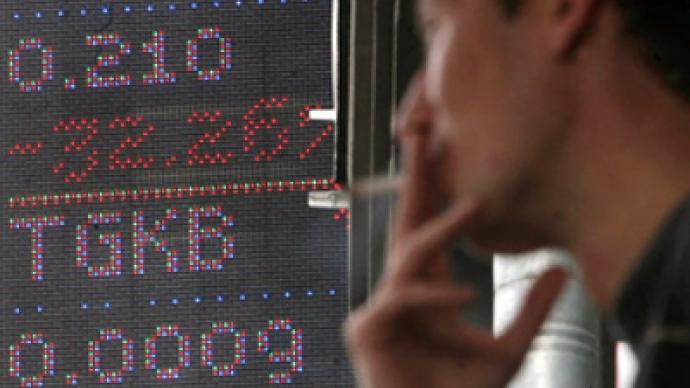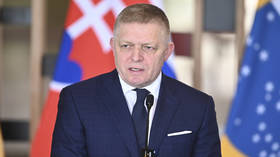Friday’s Russian Press Review

Looking at today’s Russian newspapers you won’t see many “pushy” or “punchy” headlines. It seems everyone in the print press decided to spend the day writing detailed reports on the comings and goings of the powers that
ROSSIYSKAYA GAZETA quotes President Dmitry Medvedev, who has identified government support of the financial system the most important task of today. The President, says the paper, has called on the government to make available 500 billion roubles to keep financial institutions afloat.
VREMYA NOVOSTEI says the markets will test the feasibility of the anti-crisis plan drawn up by Finance Minister Alexey Kudrin and Central Bank Governor Sergei Ignatiev. The paper reveals that the plan includes direct government support not only for commercial banks but for the Agency for Housing Loans. Its role is to refinance housing loans released by financial institutions in case they are suffering losses from bad debt.
The same paper says a meeting held in the Kremlin on the development of Russia’s taxation system lasted over three hours but did not yield any sensational results. It looks, says the paper, like all tax-related initiatives, including the one to reduce VAT from 18 to 12 per cent, will have to wait until the financial crisis is over before being implemented. The paper predicts that the new structure of the Russian taxation system will emerge not earlier than 2009.
IZVESTIA writes that the State will go on making huge efforts and dedicating vast resources to tackling the credit crisis that is rocking the Russian market.
The paper also investigates the possibility that Georgia’s failed military campaign could have been financed by money made by Georgian businessmen in Russia. There are over a million ethnic Georgians living in Russia. And Moscow-dwelling Georgians top the list of the richest Georgians in the world. The paper reports that ethnic Georgians in Russia wire home a combined total of one billion U.S. dollars a year. However none of the richest Muscovites of Georgian origin supports the Saakashvili regime, continues the paper. One of them, the chairman of the Georgian Union of Russia, Mikhail Khubutia, is quoted by the paper as saying: ‘None of us has any perspectives in Georgia, including the richest. Saakashvili is very naïve if he thinks the West will allow him to export Georgia’s produce to Europe. Europe doesn’t need extra competitors in the market. America will use Georgia, will build its military bases there but it will never allow Georgia to prosper. No country where there are American bases ever prospers.’ The paper says, even Georgian criminal gangs in Russia do not fund the Saakashvili government . Most of the money sent home by ethnic Georgians goes to their relatives or is spent on maintenance of their own homes, writes the paper.
KOMSOMOLSKAYA PRAVDA publishes an interview with the president of the Russian Union of Industrialists and Entrepreneurs, Alexander Shohin. Asked if he sees the current financial crisis as America’s retaliation for Russia’s victory over Georgia, he says: “It was U.S. Secretary of State William Burns who said Russia is paying for Georgia with the financial crisis… I see it as a Freudian ”slip of the tongue" and also wishful thinking: they’d want us to suffer a financial crisis for Georgia’. Asked about the possibility of a crisis on the scale of the 1998 defaultj, Shohin says: the situation is totally different. That crisis was about government finance only. This one was born in the private sector and will stay in it. In Alexander Shohin’s opinion, the paper says, the crisis will have impact mostly on people who own shares and are active in the market.
KOMMERSANT writes: ‘The State is ready to throw in billions to save the market!’ The paper says the stock and commodity markets will show today if the State’s generosity is going to do the trick.
NEZAVISIMAYA GAZETA writes under the headline ‘NATO steps on the breaks’: the Northern Atlantic alliance is inclined to start the normalisation of its relations with Russia. But so far, says the paper, NATO is attaching unacceptable terms to its friendly signals. The paper quotes Russian Envoy to NATO Dmitry Rogozin, who says a serious change in NATO’s view of Russia and its tone in dialogue with Russia, is highly possible in the near future.
TRUD is more pessimistic about the financial crisis than any other newspaper. It says in its lead story that the current downturn has different roots to the crisis of 1997-98. But it will inevitably strike at our livelihoods, like the previous crisis did. The article says the impact for the labor market could be severe: dropping wages, a wave of downsizings and liquidations, the re-emergence of ‘gray’ salaries. It is evident, say the authors – Anton Zainiev and Dmitry Petrov – that the salary growth will start dropping very soon and that the current optimism among Russian wage workers is, to an extent, groundless.
Evgeny Belenkiy, RT.












